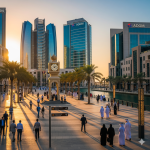This spike comes in the wake of Israeli strikes targeting Iranian energy infrastructure, including oil refineries and gas facilities. West Texas Intermediate and Brent crude closed at approximately $73 and $74 per barrel, prompting concern about possible “above‑$100” scenarios if the conflict escalates further.
Fuel & Transport Costs
Since the UAE follows international fuel price trends, September’s retail petrol prices are likely to climb. With crude near $74, analysts warn drivers to brace for higher petrol bills this month.
Airlines have also adjusted route planning, avoiding certain Middle Eastern airspace—a shift that may translate into steeper airfares and logistical rerouting costs .
Consumer Goods & Gold Jewelry
Disruptions in airspace and trade with conflict zones may lead to short-term price increases for imported items, especially electronics, clothing, and fresh produce.
Gold prices in Dubai have already climbed nearly AED 4 per gram to around AED 412.8, driven by investor demand for safe-haven assets amid uncertainty.
Strategic Risk: Strait of Hormuz
Analysts warn that any disruption—be it mine-laying or trench blockades—at the Strait of Hormuz could trigger far sharper oil price spikes, potentially pushing Brent crude above USD 120 per barrel. That outcome would pose significant inflation pressure across the Gulf region.
UAE Market Outlook
Despite financial headwinds, Dubai’s economy remains resilient, underpinned by steady post-pandemic recovery and optimism in global trade. Still, near-term cost pressures for fuel, flights, and essential goods will likely ripple into household spending this summer.
Consumers are advised to tighten budgets and anticipate rising living costs. In turn, businesses may need to adjust pricing forecasts or hedge supply chain exposure as regional dynamics unfold.










